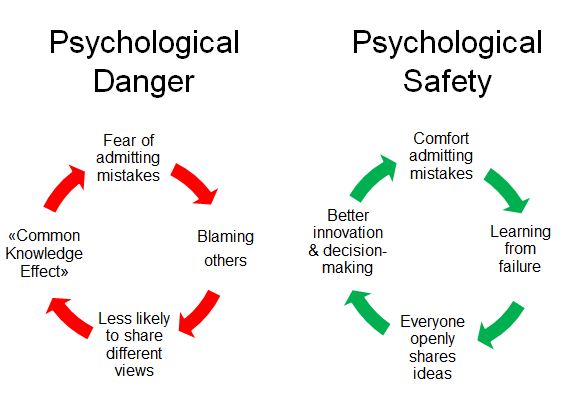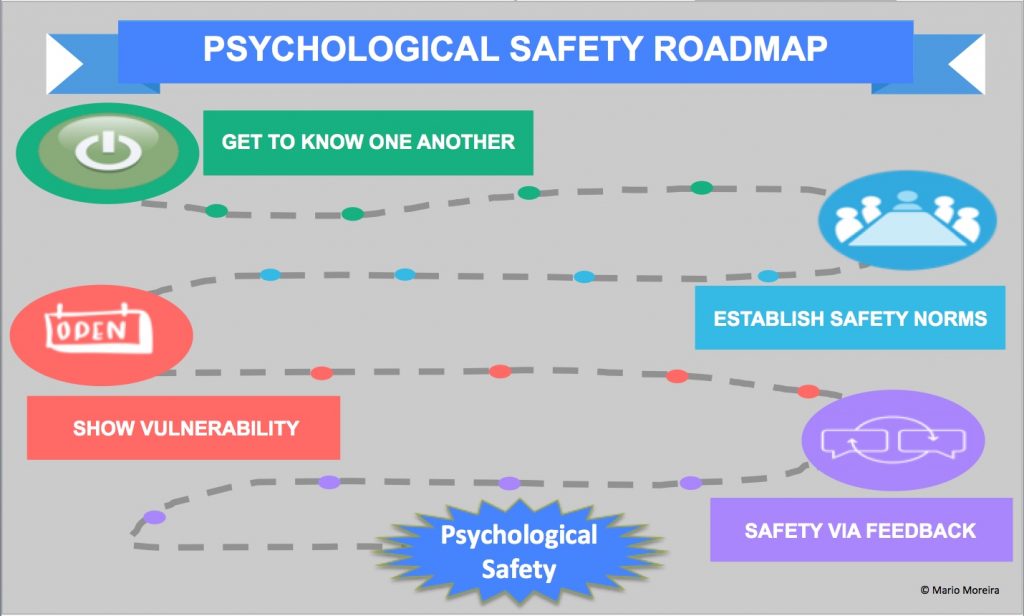What one change can I make to improve my staff team performance? (4.5min read)

Team performance and success is dependent on numerous factors of varying importance but it appears that one may stand above the others. This is the view of both Harvard professor Amy Edmondson and, more recently, Google’s Project Aristotle which studied 100s of teams over 5 years and what made them successful. In addition, it is interesting to note that extraversion, being in the same office and tenure were not considered as important variables for team performance.
What factors significantly impact team performance?
Factors such as team member reliability, role understanding, meaningful tasks and impact were in the top five but highest of all, by far, was psychological safety. To define psychological safety is to define the fabric of what it means to be a part of a team which is to feel included and safe to learn, contribute and challenge each other’s suggestions. These are the four levels that denote a team members willingness to take interpersonal risks, ask questions without fear of being perceived as ignorant and the ability to commit themselves to the success of a project.
Why is psychological safety important to team performance?
As humans we learned how to manage the impression we leave on others. During schooling we often become concerned with sounding foolish in the presence of our peers. While this protective nature can be ingrained, it is the antithesis of psychological safety and the ability to speak up. Furthermore, in her Ted Talk, Amy Edmonson explains that companies with interdependence and uncertainty must create a safe space for their teams to voice opinions and raise issues.
Many of the reasons for why its importance are obvious but are worth illuminating if this wasn’t considered previously. Companies with greater psychological safety experience:
- Fewer missed opportunities to identify flaws, raise concerns or admit/act on mistakes.
- Less time wasted pursuing the wrong ideas, strategies or under incorrect assumptions.
- Uninhibited diversity of idea generation and solution providing.
- Better results when faced with uncertainty and stronger collaboration and creativity.
- Higher levels of productivity as happy, trusting staff work harder to succeed.
- Staff staying with their company longer.
- Staff learning behavior improvements.
- A strong platform for the other four factors of performance: dependability, structure and clarity, meaning and impact.

How do I encourage psychological safety as a leader?
Understanding that psychological safety is important may not be too challenging but ensuring that your teams have it can be slightly moreso. Having previously discussed some factors to establish psychological safety here, we will expand our list of suggestions and tips for team members and leadership alike.
Daniel Goleman theory of emotional intelligence offers a great place to start as a leader. In his studies, Goleman found that 5 key components make a significant difference to psychological safety. Being self-aware, self-regulating, motivated, empathetic and possessing good social skills exemplified leadership in this area. Edmondson added to these the need to acknowledge your own fallibility, ask lots of questions and frame the work as a learning problem rather than an execution problem. While there are extensive lists on methods of strengthening this attribute, we have compiled our own list of the most important changes to implement:
Things you can introduce to the team:
- Define the norms of the team as early as possible. Define desired behaviors or will not tolerated, limit interrupting habits.
- Show full engagement by shutting down laptops and phones in meetings.
- Validate comments and avoid assigning blame.
- Create a space where the team can talk about their issues in safe constructive ways.
- Share information about your personal work style and preferences.
- Listen first and display empathy. Know the People on your team, not the Employees.
- Ask for the opinions and advice of each member. Learn from your team and be humble.
- Agree to the team’s decision even when it may contradict your opinion where it is appropriate.
- Be helpful in the areas where there is struggle and be authentic.
- Be a coach and not necessarily the problem solver.
- Give praise when it is due and equally give criticism where it is constructive.
- Be aware of your language and body language. If you need help, check this blog out.

Without a doubt, most teams will have accommodated many of the above measures without necessarily knowing it as psychological safety. Strong, capable leadership will intuitively incorporate a safe space for the team members and encourage many other measures to arrive at the same result. We have heard of Friday happy hours, phones in the middle of the table, no disagreement idea generation rounds or life check-ins being commonplace amongst many of our clients previously. We would love to know what improves your team performance and how they have responded. For further information on programs we offer to assist in this process, feel free to check this out.

